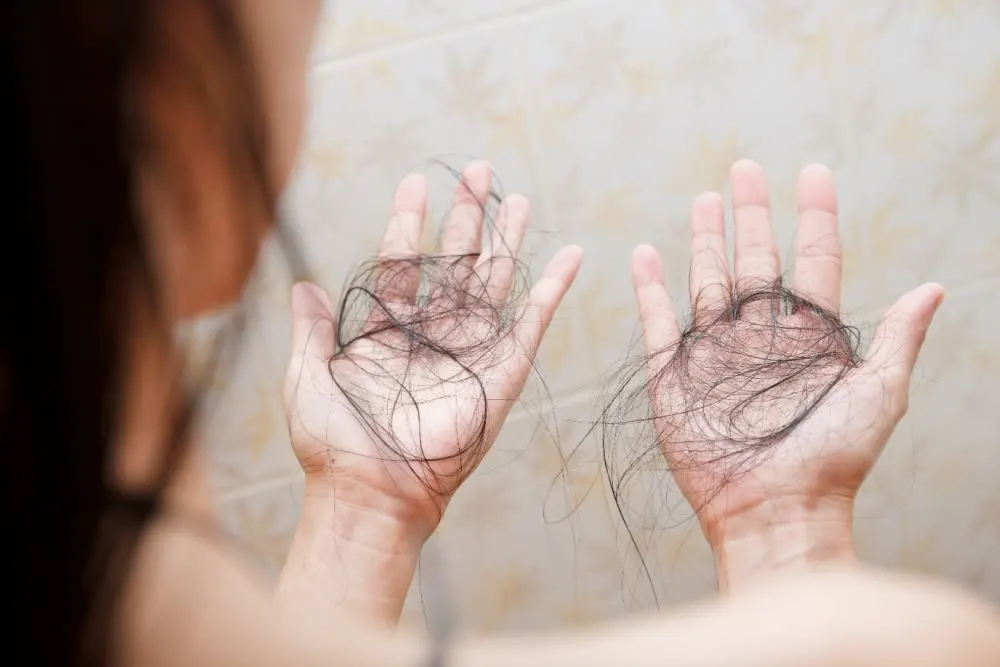How Much Hair Loss In Normal?
You’re getting out of the shower and happen to look down to see your bathroom drain clogged with hair. The words ‘hair loss’ flash before your eyes and you wonder if it’s coming after you as well.
Everyone sheds hair. Everyone. That is simply how the human body is built. Your hair will grow, fall and then new hair will grow in its place, completing the cycle of your hair strand. But sometimes it can feel like the hair fall is a bit excessive. And you wouldn’t be wrong in worrying a little about how much hairfall is normal.
On average you will lose 60 to 100 strands of hair every day. This is inconsequential when you realise that you have approximately 100,000 strands on your scalp. There are 4 stages of hair growth. 90% of your hair is in the Anagen phase which is a growth phase. Catagen follows where your hair strands stop growing. Next is Telogen which prepares your hair to detach from the scalp. And the final phase is Exogen where the shedding occurs. If your hair strands spend more time in the latter phases, this can be a cause for concern. Thus it is important to identify and understand your problem.
- Reasons for excessive hair fall
- What can you do on your own?

Reasons For Excessive Hair Fall
There truly are numerous reasons for an increase in hair fall. As you go through the list, you will realise that some of these are temporary in nature and almost seem inconsequential.
- Stress is one of the biggest contributors. It leads to a spike in cortisol levels which directly affects hair growth and hair fall.
- Using heat treatment on a daily basis can weaken your roots and hair strands.
- Hormonal fluctuations, especially during pregnancy and menopause, can send signals to your scalp to shed more hair. But these generally return back to normal.
- Wearing tight hairstyles can lead to a strain on the hair strands and constantly pulls at the roots.
- Your hair requires certain nutrients to grow, and a diet lacking those ingredients can lead to weaker hair.
- Weather changes can also affect your hair fall. Extreme heat and even humidity during the monsoons has shown to increase hair fall, so don’t worry as to how much hair fall is normal in monsoon.
- The question really is can dandruff cause hair fall, and yes it does contribute to hair fall as there is a tendency to scratch your scalp. This itching can damage your hair roots, pull at the strands and lead to breakage.
- Frequent use of hair colouring and bleaching can also weaken your hair roots.
- If you’ve started some new medication, your body might react by increasing shedding. It is important to rule this out as well.
- Excessive hair washing can strip your scalp of its protective oils, leaving your hair dry, brittle and prone to breakage. This is a big reason for an increase in hair fall, making you wonder how often to wash hair or even how often should you shampoo your hair.
Shedding of your hair is a normal process and as the body adjusts to whichever stimulus, your hair fall should reduce. If you wonder how many hair fall is normal in a day for male or how many hair fall is normal in a day for female, you should know that women tend to have more hair fall then men.
You could try the Pull Test to see if your hair is falling more than required. Grab a small patch of dry and clean hair, giving it a gentle tug. Do not yank violently on your hair. If more than 10 strands of hair come out for the 100 you have grabbed, it might be time to visit a doctor.
Always understand that there is a difference between hair loss and hair shedding naturally. Hair loss could be due to thyroid problems, male or female pattern balding, and even Alopecia. A good doctor would be able to identify the difference and explain what your next steps are.
What Can You Do On Your Own?
Here are various hair care tips that can help you counter the possible reasons for your hair loss.
- Massage your head with essential oils like Argan oil. This can boost necessary blood circulation to the scalp and creates a protective layer on your head.
- Find ways to reduce your stress. Exercise, meditation, yoga, regular breaks from work, and even just a walk can help alleviate the pressure.
- Applying diluted Lemon juice has shown to boost the health of your scalp and hair, removing excess oils and fungi which inhabit your scalp.
- A good diet of Iron, Zinc, Vitamin C and D, Proteins and Fatty acids, can directly affect the look and growth of your hair strands.
- Aloe Vera is shown to reduce hair fall by hydrating the scalp and hair. It boosts the health of your scalp and is shown to directly reduce the occurrence of dandruff as well.
- Avoid heat treatment and styling products until your hair fall has reduced. When tying your hair up, be gentle with it and don’t allow your strands to be constantly pulled back.
- A Green Tea rinse can boost hair growth and also add a layer of shine to your clean hair.
- Create a paste of Fenugreek seeds and apply it to your hair. This can repair your hair follicles and help in the growth of your hair.
Overall you need to wash your hair regularly and maintain proper hair hygiene. Don’t worry about how much hair fall is normal while combing or how much hair fall is normal while shampooing. Use a good shampoo and conditioner to protect against the external irritants that are leading to your hair loss. Try the Head and Shoulders Anti Hairfall shampoo that can reduce breakage and leave you with 10x stronger hair. You can also use the Head and Shoulders Neem shampoo for the answer to ‘do dandruff cause hairfall’ or the Head and Shoulders Active Protect 2 in 1 Shampoo and conditioner. Using these regularly can take care of the excess oil and dirt that is clogging up your pores and leading to weaker roots. There will always be moments where you feel like your hair fall is excessive, but products and home remedies can at least help you remove one layer of stress from your life.



